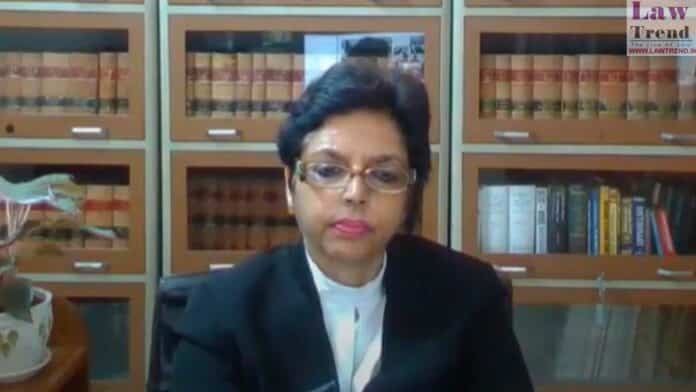Supreme Court judge Justice Hima Kohli said on Saturday the essence of justice lies in speedy resolution of disputes but the “groaning legal system” has seriously impacted the timelines for settlement of cases.
Observing that rule of law is the “corner stone” of any democratic society, Justice Kohli said various modes of alternative dispute resolution (ADR) have opened the doors for speedy resolution of cases wherever possible.
Justice Kohli was delivering the keynote address at a seminar “On Evolution and Future of Military Jurisprudence An Indian Army Perspective” organised by Institute of Military Law at Manekshaw Auditorium here.

During her address, she touched upon issues including vacancies in the Armed Forces Tribunal (AFT) benches and also the landmark judgement of the apex court which was instrumental in opening the doors for permanent commission to women in the defence forces.
“The essence of justice lies in speedy resolution of disputes and its settlement in the interest of all the stake holders. However, the groaning legal system, be it the AFTs or the High Courts and the Supreme Court, has seriously impacted the timelines of case settlement,” she said.
Justice Kohli said the military justice dispensation must ensure that rule of law and the principles of natural justice are adhered to at every step of any trial conducted by military courts.
“The right to an impartial trial is critical to ensure that in a trial or proceeding related to a member of the Armed Forces, he/she receives a fair hearing and that the outcome of the case is not predetermined,” she said.
Justice Kohli said rule of law is a guarantee to all the citizens, irrespective of their social or economic status, an assurance that they are protected by law and have a right to seek justice, whenever their rights, as enshrined in the Constitution and the statutes, are violated.
“Rule of Law implies that the government, statutory authorities and organizations must discharge their functions in a manner that upholds the dignity of an individual,” the judge said.
Justice Kohli said in the recent past, the Indian judicial system has attuned itself to Artificial Intelligence and the process was hastened with the onset of the COVID-19 pandemic.
“From my experience over the past three years, I can assure you that virtual hearings and virtual court rooms have gone a long way in enabling access to justice from the remotest part of the country,” she said.
Justice Kohli said this facility can be utilised for conducting court martials and summary trials where witnesses who are required to depose and would otherwise have to be physically summoned, can log in virtually from any part of the country and arguments can also be addressed on the virtual platform.
She said it was expected that AFTs would lighten the burden of the high courts that are “over-burdened with docket explosion” and render expedited justice.
“But one of the major handicaps faced by the AFTs has been the numerous vacancies in the principal bench and the regional benches, leading to an accumulation of over nineteen thousand cases across all AFTs,” she said.
Justice Kohli said very recently, the Appointments Committee of the Cabinet has approved appointments to fill 23 vacancies in AFTs.
“It is hoped that this move will ease the ever-growing backlog of cases,” she said.
The judge said it is imperative to provide AFTs with adequate infrastructure, updated technology and staff so as to function effectively, efficiently and seamlessly.
Justice Kohli said one critical area of course correction is “non-application of judgments” rendered by courts on policy issues.
“On several occasions, it has been noticed that when courts and tribunal pronounce judgments on certain principles of law that came to be tested and upheld by the Supreme Court, these decisions are not applied uniformly to all similarly situated personnel, thus compelling them to file independent petitions,” she said.
She also highlighted a “most significant milestone” in the Indian Armed Forces, which is the landmark judgment that was instrumental in opening the doors of permanent commission for women who were earlier offered only short service commission.
“This path breaking decision that has emanated from a judgment rendered by the Delhi High Court in the year 2010 and upheld by the Supreme Court in the year 2020, has positioned at centre stage the importance of fairness and equality in all spheres of the Armed Forces, including the process of commissioning and promotion of women officers,” she said.
Justice Kohli said the decision is a testament to the growing recognition of the value that women can bring to the armed forces.
“Offering Permanent Commission to women officers is not just about fair play and equality, which are priceless virtues in their own right; it is also about recognizing the unique skills and abilities that women bring to the Armed Forces, which is a different perspective, a different set of experiences and a different set of skills,” she said.
Justice Kohli said by offering women permanent commission, a message goes out loud and clear that the armed forces value the contribution of women and the organisation is committed to providing women with same opportunities for career advancement as their male counterparts.
“This ‘great leap towards equality in the Armed Forces’, will have a cascading effect. It sets a tempo for the society to promote gender equality and eliminates patriarchal attitude towards women,” she said.







